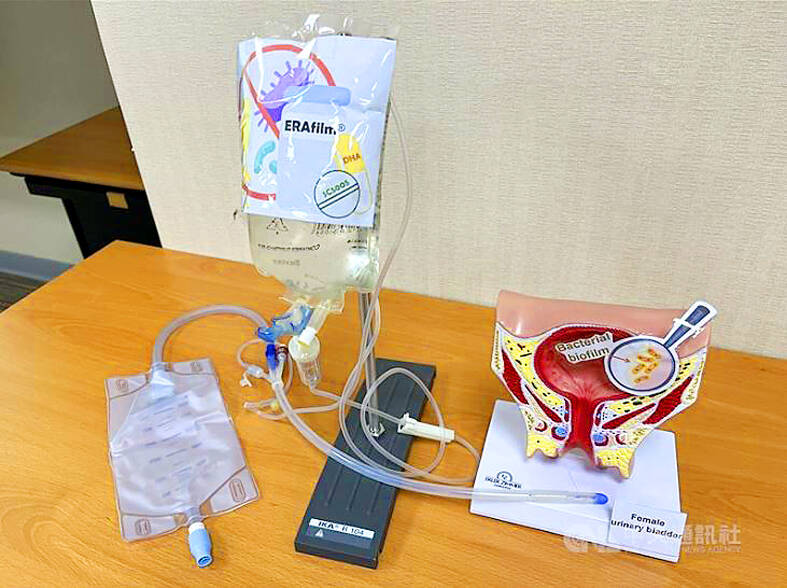A National Taiwan University (NTU) study has concluded that docosahexaenoic acid (DHA) combined with a small-molecule medicine eradicates bacteria biofilms on catheters, which could help prevent catheter-associated infections common among hospital inpatients.
Biofilms are a collection of different species of bacteria DHA could prevent, that can gather on the surfaces of artificial implants or medical devices, said Chiu Hao-chieh (邱浩傑), a professor at the university’s Department of Clinical Laboratory Sciences and Medical Biotechnology.
When biofilms form on surfaces such as urinary catheters or pacemakers, they become difficult to remove due to shields that block attacks from the immune system or antibiotics. This significantly raises the chances of infections such as catheter-associated urinary tract infections (CAUTIs), Chiu said.

Photo: CNA
“For adult patients who are hospitalized, about one-quarter require urinary catheters during their stay,” he said, adding that there is a 75 percent chance of developing a CAUTI after having a catherer inserted.
Citing data from the US, Chiu said that CAUTIs cost the US an extra US$450 million in medical expenses each year and have a 2.3 percent mortality rate.
Chiu’s team, funded by the National Science and Technology Council, found that DHA, a fatty acid that is widely used as a dietary supplement, combined with SC5005, a small-molecule medicine that was first synthesized by his team, can penetrate biofilms.
Together they display synergistic bactericidal activity — the ability to kill the bacteria.
Within 10 minutes, the combination of DHA and SC5005 can effectively eradicate more than 95 percent of biofilms on urinary catheters collected from patients who developed CAUTIs, regardless of the species of the bacteria or their drug resistance, Chiu said.
While no detectable cytotoxicity toward human cell lines was observed, the team also tested whether Staphylococcus aureus, a common bacterial species in biofilms, would develop drug resistance after long-term exposure to the combination.
After 35 consecutive days of using the combination, no resistance appeared to have built up, regardless of whether the Staphylococcus aureus strain was resistant to other drugs, Chiu said.
“This indicates that our combination can be safely used for the long term,” he said, adding that the team has decided to name the combination “ERAfilm.”
Chiu said he expects saline containing “ERAfilm” — which is still in the nonclinical development stage — could be injected into patients’ bladders. It would then remove biofilms on the urinary catheters daily to prevent CAUTIs.
Asked about other medications that can remove biofilms, Chiu said that there is only one competitor abroad that has developed a drug with similar effects.
It has entered the clinical stage, and uses bacteriophages, he said.
“However, bacteriophages can only infect specific bacteria, unlike our approach, which is broad-spectrum,” Chiu said.
Aside from Taiwan, the team has also obtained or is in the process of applying for patents for SC5005 and its derivatives in other countries and regions, such as the US, China and the EU, he said.

A relatively large earthquake may strike within the next two weeks, following a magnitude 5.2 temblor that shook Taitung County this morning, the Central Weather Administration (CWA) said. An earthquake struck at 8:18am today 10.2km west of Taitung County Hall in Taitung City at a relatively shallow depth of 6.5km, CWA data showed. The largest intensity of 4 was felt in Taitung and Pingtung counties, which received an alert notice, while areas north of Taichung did not feel any shaking, the CWA said. The earthquake was the result of the collision between the Philippine Plate and the Eurasian Plate, the agency said, adding

Snow fell in the mountainous areas of northern, central and eastern Taiwan in the early hours of yesterday, as cold air currents moved south. In the northern municipality of Taoyuan, snow started falling at about 6am in Fusing District (復興), district head Su Tso-hsi (蘇佐璽) said. By 10am, Lalashan National Forest Recreation Area, as well as Hualing (華陵), Sanguang (三光) and Gaoyi (高義) boroughs had seen snowfall, Su said. In central Taiwan, Shei-Pa National Park in Miaoli County and Hehuanshan National Forest Recreation Area in Nantou County saw snowfall of 5cm and 6cm respectively, by 10am, staff at the parks said. It began snowing

HOLIDAY EXERCISE: National forest recreation areas from north to south offer travelers a wide choice of sights to connect with nature and enjoy its benefits Hiking is a good way to improve one’s health, the Forestry and Nature Conservation Agency said, as it released a list of national forest recreation areas that travelers can visit during the Lunar New Year holiday. Taking a green shower of phytoncides in the woods could boost one’s immunity system and metabolism, agency Director-General Lin Hwa-ching (林華慶) cited a Japanese study as saying. For people visiting northern Taiwan, Lin recommended the Dongyanshan National Forest Recreation Area in Taoyuan’s Fusing District (復興). Once an important plantation in the north, Dongyanshan (東眼山) has a number of historic monuments, he said. The area is broadly covered by

Global bodies should stop excluding Taiwan for political reasons, President William Lai (賴清德) told Pope Francis in a letter, adding that he agrees war has no winners. The Vatican is one of only 12 countries to retain formal diplomatic ties with Taiwan, and Taipei has watched with concern efforts by Beijing and the Holy See to improve ties. In October, the Vatican and China extended an accord on the appointment of Catholic bishops in China for four years, pointing to a new level of trust between the two parties. Lai, writing to the pope in response to the pontiff’s message on Jan. 1’s